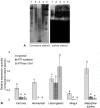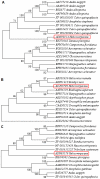ATP hydrolyzing salivary enzymes of caterpillars suppress plant defenses
- PMID: 22848670
- PMCID: PMC3405022
- DOI: 10.1371/journal.pone.0041947
ATP hydrolyzing salivary enzymes of caterpillars suppress plant defenses
Abstract
The oral secretions of herbivores are important recognition cues that can be used by plants to mediate induced defenses. In this study, a degradation of adenosine-5'-triphosphate (ATP) in tomato leaves was detected after treatment with Helicoverpa zea saliva. Correspondingly, a high level of ATPase activity in saliva was detected and three ATP hydrolyzing enzymes: apyrase, ATP synthase and ATPase 13A1 were identified in salivary glands. To determine the functions of these proteins in mediating defenses, they were cloned from H. zea and expressed in Escherichia coli. By applying the purified expressed apyrase, ATP synthase or ATPase 13A1 to wounded tomato leaves, it was determined that these ATP hydrolyzing enzymes suppressed the defensive genes regulated by the jasmonic acid and ethylene pathways in tomato plant. Suppression of glandular trichome production was also observed after treatment. Blood-feeding arthropods employ 5'-nucleotidase family of apyrases to circumvent host responses and the H. zea apyrase, is also a member of this family. The comparatively high degree of sequence similarity of the H. zea salivary apyrase with mosquito apyrases suggests a broader evolutionary role for salivary apyrases than previously envisioned.
Conflict of interest statement
Figures





References
-
- Alborn HT, Turlings TCJ, Jones TH, Stenhagen G, Loughrin JH, et al. An elicitor of plant volatiles from beet armyworm oral secretion. Science. 1997;276:945–949.
-
- Eichenseer H, Mathews MC, Bi JL, Murphy JB, Felton GW. Salivary glucose oxidase: multifunctional roles for Helicoverpa zea? Arch Insect Biochem Physiol. 1999;42:99–109. - PubMed
-
- Halitschke R, Schittko U, Pohnert G, Boland W, Baldwin IT. Molecular interactions between the specialist herbivore Manduca sexta (Lepidoptera, Sphingidae) and its natural host Nicotiana attenuata. III. Fatty acid-amino acid conjugates in herbivore oral secretions are necessary and sufficient for herbivore-specific plant responses. Plant Physiol. 2001;125:711–717. - PMC - PubMed
Publication types
MeSH terms
Substances
LinkOut - more resources
Full Text Sources
Research Materials

